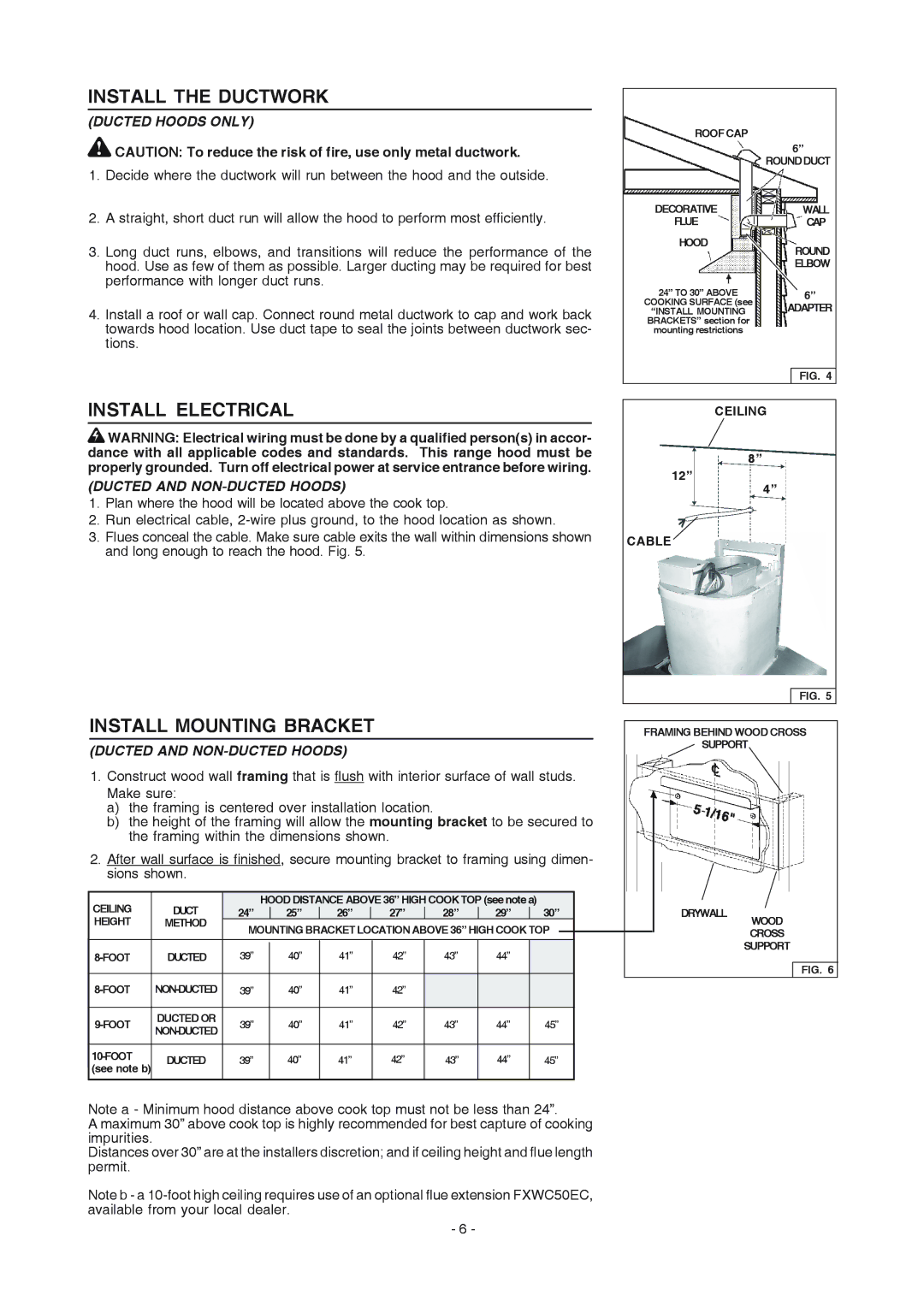
INSTALL THE DUCTWORK
(DUCTED HOODS ONLY)
! ![]() CAUTION: To reduce the risk of fire, use only metal ductwork.
CAUTION: To reduce the risk of fire, use only metal ductwork.
1.Decide where the ductwork will run between the hood and the outside.
2.A straight, short duct run will allow the hood to perform most efficiently.
3.Long duct runs, elbows, and transitions will reduce the performance of the hood. Use as few of them as possible. Larger ducting may be required for best performance with longer duct runs.
4.Install a roof or wall cap. Connect round metal ductwork to cap and work back towards hood location. Use duct tape to seal the joints between ductwork sec- tions.
ROOF CAP
|
| 6” |
| ROUND DUCT | |
DECORATIVE |
| WALL |
FLUE |
| CAP |
HOOD |
| ROUND |
|
| |
|
| ELBOW |
24” TO 30” ABOVE |
| 6” |
COOKING SURFACE (see | ADAPTER | |
“INSTALL MOUNTING | ||
BRACKETS” section for |
|
|
mounting restrictions |
|
|
|
|
|
|
| FIG. 4 |
INSTALL ELECTRICAL
![]()
![]()
![]() WARNING: Electrical wiring must be done by a qualified person(s) in accor- dance with all applicable codes and standards. This range hood must be properly grounded. Turn off electrical power at service entrance before wiring.
WARNING: Electrical wiring must be done by a qualified person(s) in accor- dance with all applicable codes and standards. This range hood must be properly grounded. Turn off electrical power at service entrance before wiring.
(DUCTED AND NON-DUCTED HOODS)
1.Plan where the hood will be located above the cook top.
2.Run electrical cable,
3.Flues conceal the cable. Make sure cable exits the wall within dimensions shown and long enough to reach the hood. Fig. 5.
INSTALL MOUNTING BRACKET
(DUCTED AND
1.Construct wood wall framing that is flush with interior surface of wall studs. Make sure:
a)the framing is centered over installation location.
b)the height of the framing will allow the mounting bracket to be secured to the framing within the dimensions shown.
2.After wall surface is finished, secure mounting bracket to framing using dimen- sions shown.
CEILING | DUCT |
| HOOD DISTANCE ABOVE 36” HIGH COOK TOP (see note a) |
| ||||||
24” |
| 25” | 26” | 27” | 28” | 29” |
| 30” | ||
HEIGHT | METHOD | MOUNTING BRACKET LOCATION ABOVE 36” HIGH COOK TOP | ||||||||
|
| |||||||||
|
|
|
|
|
|
|
|
|
|
|
DUCTED | 39” |
| 40” | 41” | 42” | 43” | 44” |
|
| |
|
|
|
|
|
|
|
|
|
|
|
39” |
| 40” | 41” | 42” |
|
|
|
| ||
|
|
|
|
|
|
|
|
|
|
|
DUCTED OR | 39” |
| 40” | 41” | 42” | 43” | 44” |
| 45” | |
|
| |||||||||
|
|
|
|
|
|
|
|
|
| |
|
|
|
|
|
|
|
|
|
|
|
DUCTED | 39” |
| 40” | 41” | 42” | 43” | 44” |
| 45” | |
(see note b) |
|
| ||||||||
|
|
|
|
|
|
|
|
|
| |
|
|
|
|
|
|
|
|
|
|
|
CEILING
8”
12”
4”
CABLE
FIG. 5
FRAMING BEHIND WOOD CROSS
SUPPORT
DRYWALL
WOOD
CROSS
SUPPORT
FIG. 6
Note a - Minimum hood distance above cook top must not be less than 24”.
A maximum 30” above cook top is highly recommended for best capture of cooking impurities.
Distances over 30” are at the installers discretion; and if ceiling height and flue length permit.
Note b - a
- 6 -
